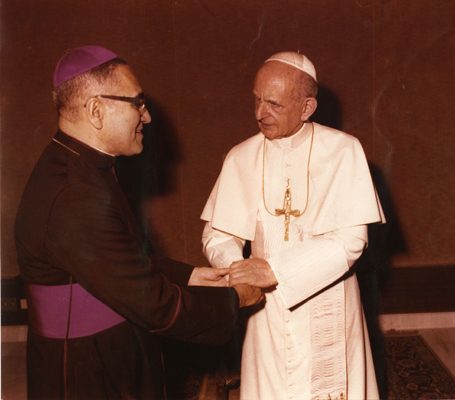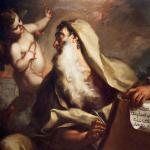
It is incorrect to say that the pope does not possess the gift of infallibility in and of himself when (in proper circumstances) he exercises that gift, and this is contrary to the proclamations of Vatican I and Vatican II. Though the pope in fact almost always acts in concert with the bishops, it is not intrinsically required that he do so, and they are always subject to his supreme authority.
A clear example of this is Humanae Vitae: an infallible document that not only was not produced in concert with the bishops, but whose truth was denied by many bishops and priests, as a current post on this board details. To deny the charism of papal infallibility for the pope alone is the medieval heresy of conciliarism. Conciliar infallibility (also considerably developed by Vatican II) applies only when a council is subject to the pope, and his approval in all respects. Thus, Vatican I stated:
Therefore, faithfully adhering to the tradition received from the beginning of the Christian faith, to the glory of God our savior, for the exaltation of the Catholic religion and for the salvation of the Christian people, with the approval of the Sacred Council, we teach and define as a divinely revealed dogma that when the Roman Pontiff speaks EX CATHEDRA, that is, when, in the exercise of his office as shepherd and teacher of all Christians, in virtue of his supreme apostolic authority, he defines a doctrine concerning faith or morals to be held by the whole Church, he possesses, by the divine assistance promised to him in blessed Peter, that infallibility which the divine Redeemer willed his Church to enjoy in defining doctrine concerning faith or morals. Therefore, such definitions of the Roman Pontiff are of themselves, and not by the consent of the Church, irreformable.
So then, should anyone, which God forbid, have the temerity to reject this definition of ours: let him be anathema.
Accordingly, Fr. William G. Most wrote:
C) Third Level: Pius XII, in Humani generis:
Nor must it be thought that the things contained in Encyclical Letters do not of themselves require assent on the plea that in them the Pontiffs do not exercise the supreme power of their Magisterium. For these things are taught with the ordinary Magisterium, about which it is also true to say, ‘He who hears you, hears me.’ [Lk 10. 16]. . . If the Supreme Pontiffs, in their acta expressly pass judgment on a matter debated until then, it is obvious to all that the matter, according to the mind and will of the same Pontiffs, cannot be considered any longer a question open for discussion among theologians.
We notice: (1) These things are protected by the promise of Christ in Lk 10. 16, and so are infallible, for His promise cannot fail . . . (2) Not everything in Encyclicals, and similar documents, is on this level – this is true only when the Popes expressly pass judgment on a previously debated matter, (3) since the Church scattered throughout the world can make a teaching infallible without defining – as we saw on level 2 -then of course the Pope alone, who can speak for and reflect the faith of the whole Church, can do the same even in an Encyclical, under the conditions enumerated by Pius XII. Really, on any level, all that is required to make a thing infallible is that it be given definitively. When a Pope takes a stand on something debated in theology and publishes it in his Acta, that suffices. The fact that as Pius XII said it is removed from debate alone shows it is meant as definitive. (“Hierarchy of Truths and Four Levels of Teaching”)
This is reiterated in Vatican II, Lumen Gentium, III, 25, which cites the earlier definition and expands upon it:
And therefore his definitions, of themselves, and not from the consent of the Church, are justly styled irreformable, since they are pronounced with the assistance of the Holy Spirit, promised to him in blessed Peter, and therefore they need no approval of others, nor do they allow an appeal to any other judgment. For then the Roman Pontiff is not pronouncing judgment as a private person, but as the supreme teacher of the universal Church, in whom the charism of infallibility of the Church itself is individually present, he is expounding or defending a doctrine of Catholic faith.
* * * * *
Further clarifications on what infallibility does and doesn’t mean:
The pope must always act consistently with received Tradition. That’s a given in Catholic ecclesiology (theology of the Church). He can never declare something out of the blue that has no precedent whatsoever. It has to be in line with the apostolic deposit, that goes all the way back to Jesus and the apostles.
The Church is not ultramontanist. That position was shot down in 1870, if by it (people sometimes disagree on its definition) someone means that absolutely everything (or even a great deal of what) the pope says is infallible, even going beyond the constriction of such decrees having to do with faith and morals. This is not true. There are carefully defined, strict conditions when his words are to be regarded as infallible.
The Catholic doesn’t accept every word a pope utters as Gospel Truth.
. . . they are pronounced with the assistance of the Holy Spirit, promised to him in blessed Peter, and therefore they need no approval of others, . . .
There are many indications in Scripture that Peter and by implication also later popes receive a special charism unique to them:
1) He alone is given the keys of the kingdom of heaven (Matt 16:19).
2) All the apostles were given the power to bind and loose, but only Peter received it by name (Matt 16:19).
3) Peter is regarded as the Chief shepherd (Jn 21:15-17; cf. 1 Peter 5:1).
4) Jesus prays for Peter in particular, that his faith would not fail (Lk 22:32).
5) Peter is exhorted by Jesus to “strengthen your brethren” (Lk 22:32).
6) Peter alone is told that he has received divine knowledge by a special revelation (Matt 16:17).
7) Peter utters the first anathema (on Ananias and Sapphira), which is confirmed by God: they were killed (Acts 5:2-11).
We gain nothing good by watering-down the prerogatives and charisms of the Holy Father, which are unique in the Church. Nor does the orthodox Catholic deny conciliar infallibility. I wrote above:
Conciliar infallibility (also considerably developed by Vatican II) applies only when a council is subject to the pope, and his approval in all respects.
I not only acknowledged conciliar infallibility (rightly understood) but even noted that it was developed by Vatican II. This was emphasized by Servant of God Fr. John A. Hardon, S. J. in his catechism that I was required to read when I was received into the Church by him.
The medieval heresy of conciliarism, on the other hand, held that the council was the supreme authority in the Church, not the pope. The Church declared against this.
***
(originally 8-4-08)
Photo credit: St. Óscar Arnulfo Romero y Galdámez with Pope St. Paul VI (6-21-78) [public domain / Wikimedia Commons]
***













